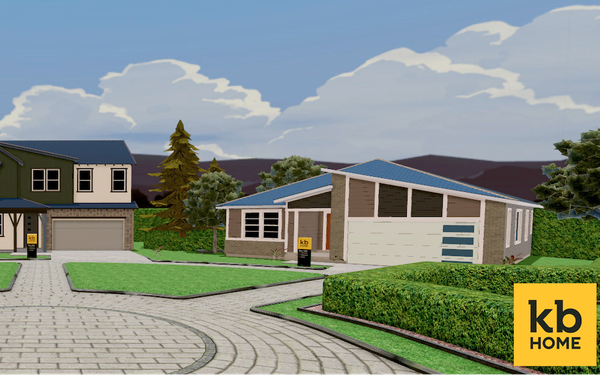
KB Home is heading to the metaverse
in what it claims is a first for home builders. The immersive experience invites users to explore 3-D styles, from farmhouse to contemporary to Spanish, and the many ways they can personalize their
homes, from flooring to faucets. Amit Desai, chief marketing officer of the Los Angeles-based company, tells
Marketing Daily what the company hopes to learn through the launch.
Marketing Daily: The stereotype of the metaverse so far is that it's a bunch of 13-year-olds on Roblox buying new outfits for their avatars. It's not exactly the audience who'd be interested
in Craftsman style or cabinet finishes. Who do you think will find you in Web 3.0?
Amit Desai: That's the stereotype -- that the metaverse is all Roblox and Fortnite, originating from
gaming platforms. We've deliberately built ours in Decentraland because of its accessibility and ease of use. It attracts an older crowd that aligns with our home-buying audience. Our sweet spot is
first-time home buyers: millennials and, increasingly, Gen Z. We've always connected with younger home buyers who are purchasing their first home, so this is a natural extension. We need to make sure
that we're everywhere that next generation of home buyers is.
advertisement
advertisement
Marketing Daily: How do you describe these Decentraland users?
Desai: It's a good balance of age groups,
mostly between 25 and 35, and a nice distribution between males and females. We thought, "This is the perfect virtual platform to dip our toes in, establish a presence and learn."
Marketing
Daily: What are you hoping to learn?
Desai: We're always interested in giving that next generation of home buyers a sense of what it means to build a home. What's unique about KB
Home is how we enable buyers to personalize their homes, selecting the floor plan that meets their needs and budget. They can choose that exterior style and personalize the interior, particularly
kitchens and bathrooms. So we hope to learn how best to connect with buyers and engage about those choices.
We know buyers will spend more and more of their time in the metaverse. So we want
to know how to inspire them when they're there. And then what's the best way to bring them from this experience to home buying in the real world? We have a lot to learn, but this will be a very
credible sales channel for us over time.

Marketing Daily: Credible is an interesting word. So far, many brands are charging in, blathering about it as the next frontier. It's more a gimmick than a sales tool. What might build that
credibility for you?
Desai: While this accelerated during the pandemic, there's been a strong need for visualization tools for prospective home buyers. We've already got lots of them on
our website, from interactive floor plans to design visualizers. This is the next evolution, which lets us invite people to truly immerse themselves in a model home. They can learn about significant
features. For example, we're the No. 1 most energy-efficient national home builder, so there's a tremendous opportunity to educate them about water conservation and healthier indoor air
environments.
Marketing Daily: Plenty of brands are holding off, at least until it's clearer what the actual metaverse -- still years off– -- will look like.
Desai: In the '90s, brands debated whether to launch a website. Then in the 2000s, they had debates about being on social. This is the next step. We want to make sure we have a presence
there.
Marketing Daily: In early 2020, the idea that people might buy homes based on nothing but an internet tour would have seemed far-fetched. But that's happened. Will that speed up
metaverse adoption?
Desai: The pandemic did create an environment where people became increasingly comfortable with digital tools. But because purchasing a home is the single biggest
investment or decision you will make in your lifetime, most people still want to see the model homes and experience the community.
I don't think that's going away anytime soon. But digital
tools better prepare and educates buyers about all the possibilities. We just want to make sure we're connecting and keeping these younger homeowners in mind all the time.